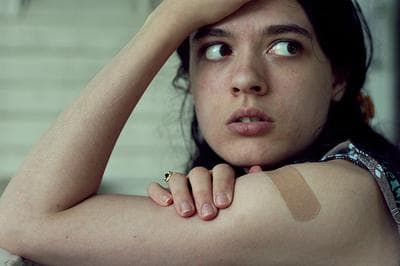Advertisement
So Should My Daughter Get The HPV Vaccine?

By Karen Weintraub
Guest Blogger
For three years, I’ve given my daughter a pass on the HPV vaccine, which prevents infection from the cancer-causing human papilloma virus.
The vaccine approved in 2006 was too new, I thought. I didn’t want to expose her to a shot that hadn’t been tested in millions of people for years and years. And she was too young for me to be concerned. HPV is passed sexually, and though the federal government recommends girls get the vaccine as young as age 9, my pediatrician agreed we should wait a few years.
My daughter started high school this month, though, and is scheduled for her 14-year-old physical in a few weeks.
I hope it’s still a few decades until she brings home her first boyfriend, but I can’t justify putting off my vaccine decision any longer.
That was already on my mind when presidential candidate Michele Bachmann wrongly suggested the vaccine caused mental retardation earlier this month. (Last night during another debate, Bachmann backed away slightly, saying she was simply recalling a story a mother had told her.)
So this week I looked at the data, and talked it over with my pediatrician, and I’ve decided she should get the vaccine.
Hoping my research might help someone else facing the same question, I thought I’d spell out what I’ve done and why I came to this conclusion:
The Safety Profile
First of all, I should say that my daughter is perfectly healthy and has been all of her life. She has no serious allergies or immune issues. I can’t even remember the last time she had a cold.
With that in mind, I decided to look at the vaccine’s safety profile.
In a report published last month by the Institute of Medicine, a panel of experts concluded that 36 cases of anaphylaxis shock might have been caused by the three-dose vaccine – out of more than 30 million shots given. They found no solid evidence connecting the vaccine to any other health problems. I can live with 1 in a million odds.
Adverse Events
The long-term data was less convincing — because there is none. As a medical journalist, my imagination can run wild about things we might discover 20 or 40 years from now, and I’m much more comfortable with the polio vaccine, which has been used since before I was born. So, one strike against the HPV vaccine.
I also took a look at the Vaccine Adverse Event Reporting System data, which catalogues all the complaints made about a vaccine. These numbers were pretty scary: 68 deaths and 15,000 serious reactions reported – but two pediatricians and a public health official were reassuring.
“I can’t promise you” there’s never been a death associated with the HPV vaccine, said Dr. Melinda Wharton, the deputy director of the National Center for Immunization & Respiratory Diseases, which is part of the federal Centers for Disease Control and Prevention. But after investigating every death, “we see no pattern that suggests vaccines are causally associated.”
Advertisement
[module align="right" width="half" type="pull-quote"]In other words, the people who died after getting the vaccine would likely have died even if they’d never been vaccinated.[/module]
In other words, the people who died after getting the vaccine would likely have died even if they’d never been vaccinated.
Wharton said her department is looking into whether the vaccine could cause problems in young people who have a genetic tendency toward blood clots, but few people have reported clots after vaccination, and there are no biological mechanisms that would explain why the vaccine would trigger clots, she said.
Herd Immunity
The other key factor for me was herd immunity. Herd immunity means that my kid is less likely to get a disease if everyone around her has been vaccinated against it. Some people use this as an excuse not to get their children vaccinated against polio or measles – if everyone else has the vaccine, their child is at very low risk of contracting the disease.
That’s certainly true for a disease like polio that has been eradicated from most of the world. (There have been 401 cases worldwide so far this year, mainly in Chad, Pakistan, the Democratic Republic of Congo, the Ivory Coast, Afghanistan and Nigeria.)
But it’s not true for HPV, which probably infects at least one in three sexually active Americans at some point.
There’s not enough herd immunity yet, and won’t be for years, to give my daughter protection against HPV.
Risky Business
Most people have no symptoms from HPV and it clears from their systems within 2 years without medication. But if we skip the vaccine, she’ll be at higher risk for genital warts, and for cancer of the cervix, vulva, anus and back of the throat. Roughly 20,000 American women and 10,000 American men got cancer from HPV between 2003 and 2007. Hispanics and blacks are at higher risk for cervical cancer than whites.
It’s not clear whether condoms can prevent HPV, and oral sex is believed to be a major source of transmission. So there’s no other good way to protect against HPV besides the vaccine – except abstinence and monogamy. Obviously, those both have a lot going for them. But perhaps my daughter will have other priorities than her mother.
What does my daughter think? Needless to say, she doesn’t love the idea of getting three shots – one of her friends said it’s really painful because they have to stick it into the muscle. But she dislikes the idea of genital warts and cancer even more. “Of course I’m getting it,” she told me.
Karen Weintraub is a freelance health and science writer based in Boston.
This program aired on September 23, 2011. The audio for this program is not available.
